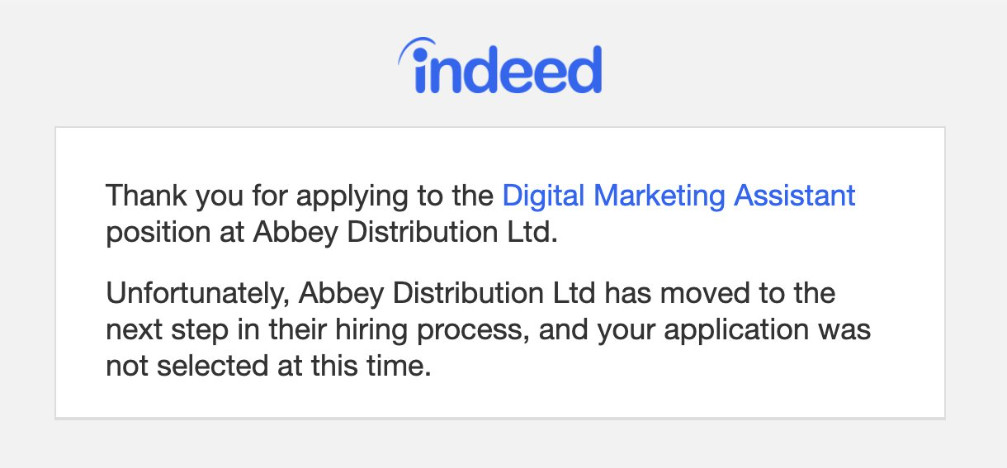How to tell someone they did not get a job

Indeed, it is promising work as a hiring manager or a recruiter in a firm. You help people achieve their career goals while improving competitiveness and contribute towards the development of business.
Amongst the worst elements of this work is the delivery of bad news. it involves advising a candidate optimistically that they have not received the employment. There are multiple sympathetic strategies to let people know they have fallen just short of the mark. These strategies will help you maintain your organization's image and pose a good impression of the organization that it actually cares for the candidates.
the best candidates faster



One of the significant obstacles for recruiters is the rejection of applicants. This blog post will advise you how to say "Sorry you haven't got the job" in such a manner that you retain a positive employer brand, sustain candidates in your expertise, and develop your experience relating to candidates.
Recruiters are architects of hope for certain people but dream shredders for others. And who wants to be the reason for someone's disappointment?
Nobody, perhaps.
It is genuinely awkward to tell an applicant that they did not perceive the job, but it's something that you must go through when you are looking for the perfect job candidate. In addition to being awkward, the way you dismiss applicants will make your recruitment formula or tear it down. This strategy of how you decline an applicant has a natural effect on the firm's credibility.
Positively rejecting applicants has many benefits. Research in HR has shown that 97 percent of the applicants refer the firm to other people if they get the delightful experience and 95 percent of the candidates are likely to apply again for the job when they avail opportunity after getting positively treated in their first experience.
Besides general consensus, a candidate's experience does not stop because you want not to recruit him. Candidates who will not cut a specific job will suit perfectly with sure of your potential job openings. The most critical metrics of recruiting, time to employ, cost per recruit, and selection can be improved substantially by retaining high-quality applicants in your talent pool and interacting with them.
Now that we have stated that the refusal process is improved and taken further into account by incorporating a human contact let us explore various directions for the polite rejection.

Reject a candidate via e-mail
E-mail – the most popular method for sharing technical information and communication may seem to be fair to distribute news. It is fast, customize the applicant's rejection e-mail templates, which utilizing Applicant Tracking System can be delivered in bulk. And you are done.
The concern is that the e-mail of refusal may be regarded as impersonal and cold. Imagine discouraged looks on the other end of the phone reading this kind of e-mail and finding out that they didn't acquire the position.
While e-mail may be the comfortable way to send unfortunate news to your applicants, other methods that are more consistent with your Talent Acquisition Plan should be considered.
Reject using a phone call
Often recruiters use telephone calls to remind their applicants who have not been chosen. But those calls have their advantages and disadvantages. One of the most significant benefits of this discussion is undoubtedly the fact that the recruiter will use his voice to ease the disappointment of the candidate and connect with them at a personal level.
Ensure that you are as careful and thoughtful as possible about the candidates. Be confident they would enjoy spending the time to clarify why they have not had this job, but bear in mind that there is always a gap between you and the candidate because of lack of visual appearance.
Be honest, brief, and pleasant.
Do not hold out a job applicant. It indeed against ethics; it's rude and inappropriate. The Sooner the candidates are aware of the application status, the sooner they will start looking for other positions.
Bear in mind that applicants will go right to social media and write reviews to post their experience and feedback. Corporate reputation will be adversely impacted by the handling of candidates other than being considerate and competent.
Deliver the news as politely as you would want to hear if you were rejected
Once you have selected a candidate for the position available, call the other waiting applicants (or e-mail). Get to the point directly, without excuses or a brief conversation about your purpose of the call. Choose your words wisely to ease the knock: for instance, declined is preferable to rejected. Remember that a genuine compliment will help to lower the psychological impact of the bad news. So, it isn’t a bad idea to tell them what you liked about them during your meeting. Such words of appreciation can boost the confidence of the candidates after receiving a stressful blow.
How to answer when the applicants ask for a reason for a rejection
As per the LinkedIn talent trends survey, the overwhelming majority of candidates (94%) would like interview feedback – even if they don't get the position. "To provide a talent with interview reviews is an easy means of giving a good experience and showing you care about their hard work and success''.
An applicant who has been rejected could question why they were not chosen, especially if they deemed fit for the position. However, if you want to answer, only state reasons strictly relevant to the job in question. You do not have to justify hiring decisions to anyone but using a sentence of encouragement would not hurt.
For instance, you may say: The applicant you chose has the job experience. Anything like this is also acceptable: the often-unanswered discrepancies in the past of your work have become an issue. There is often no clear explanation other than the tough rivalry between highly-skilled applicants after the post-saw. Politely say it to the candidate.
The reality is that fate may be a consideration for the intensely competitive selection process. Still, it is easier to assume that the person you have selected was just the right candidate.
When to deliver the news
You just have to talk face to face with the candidate you have refused if he/she is an existing staff member, who has not received a promotion or new post. Delivery of news is essential here—they'll be disappointed and likely uncomfortable by whatever you say.
Be sure that before anybody else they realize that they did not get the job (even the potential member you hired) and provide the greatest possible input. Make your disappointing news meeting really brief and hold a few days later follow-up meeting to address the case, including progress training, to ensure further prospects for intra-house support.
Keep the doors of opportunity open
If the candidate is impressive and is a good suit for the firm but did not make the cut due to some reasons then let them know that you are likely to consider them for any future position related to their expertise. If you think that the nominee will never be a successful fit, don't put out false expectations; you won't be doing any favors for yourself or the refused candidate by doing that.
We hope that these tips will help you achieve good results in your pursuit to become an excellent recruiting officer. Declining someone a position is always stressful but doing that in a humane manner will help both the firm and the candidate.
Author Bios:

Grace Griffin is a member of the writer's Team on Research prospect. She has a bachelor's in Law, Masters's in Literature, and a Ph.D. in Economics. she wanted to explore all the possible subjects in the world. Still, she is afraid that she couldn't do so. Grace is a technical writer and writes research-based content. As for her hobbies, she loves reading articles, blogs, magazines, newspapers, and books.
the best candidates faster




